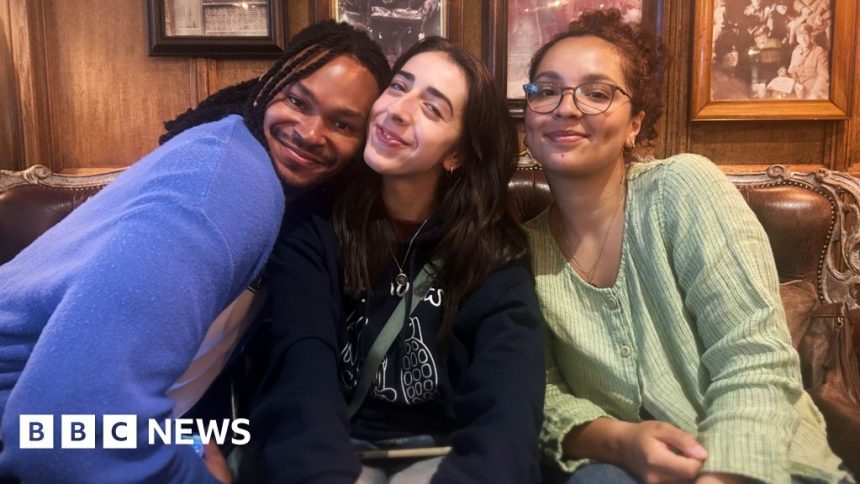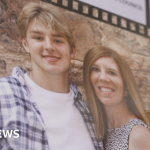Three is the magic number: How friendship put Tiny Habits on the path to stardom
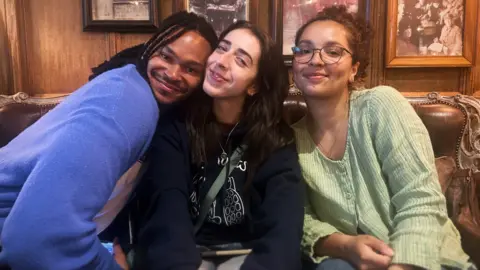 BBC
BBC“Holy crap they are good. I need more Tiny Habits!”
Those were the words of rock legend David Crosby, posted to his Twitter profile in May 2022.
He’d just stumbled across the music of three college students from Boston, whose lush harmonies and bucolic melodies reminded him of his own work in Crosby, Stills and Nash.
Before long, other musicians took note. Kacey Musgraves invited them to sing with her, Noah Kahan took them on tour and Elton John (it’s always Elton John, isn’t it?) championed them on his radio show.
“They’re delicious,” he enthused. “We love them.”
The band are still overwhelmed.
“The question we keep asking is, how do they know about us – all of these people we’ve looked up to for, like, ever?” marvels singer Maya Rae.
“Like, with David Crosby, that was only five months into us being a band, and he found us on some YouTube video.”
“I guess it’s the power of social media,” says her bandmate Cinya Kahn.
“It’s not like we’re sending these people our music!”
Since Crosby’s tweet, the trio have gone from viral videos to a headline act with impressive speed.
They’ve just finished a sold-out European tour and released a critically-acclaimed debut album, All For Something, recorded with Phoebe Bridgers’ producer, Tony Berg.
“You can’t process all this stuff in the moment,” says the band’s final member/gentle giant, Judah Mayowa.
“It just happens, then I look back later and think, ‘Wow, we actually did that. That was kinda cool.”
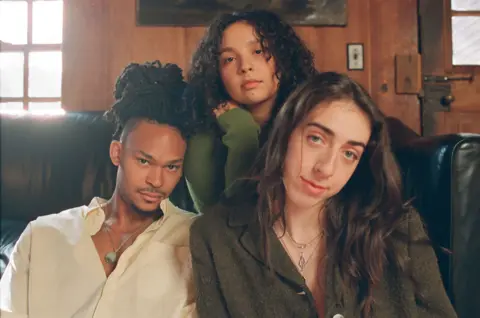 Maggie Barger
Maggie BargerThe Tiny Habits story begins, as all good stories should, in a university toilet.
All three members had enrolled in Boston’s prestigious Berklee College of Music, only to have their studies disrupted by the pandemic.
“So basically the way you would make friends was on Instagram,” recalls Maya, who’d joined the school as an international student from Canada.
“Cinya posted an Instagram story about not knowing how to use the toilet roll holders in our dorm building. So I swiped up and said, ‘Me neither, let me know if you work it out.’
“A while later, she saw the DM and was like, ‘Hey, I figured it out’.
“She sent me a whole video about how to use it and we met up and sang that night in my room. The rest is history.”
They completed the trio with Alabama-born student Judah, whose music they’d also discovered on Instagram, but the chemistry wasn’t instantaneous.
“It might have been if I wasn’t so nervous!” laughs Cinya. “But we’d not been socialising because of Covid, so we were facing the terror of being around people again and also singing with them.”
“But as we kept doing it we all realised, ‘Oh, there’s something exciting here’,” adds Maya.
“It wasn’t just the singing,” says Judah. “I was like, ‘Hey, I kind of like these people’.”
‘Simply unfair’
They started off with covers. Recording themselves in college stairwells and cramped bathrooms, they’d re-arrange pop hits like Kelly Clarkson’s Breakaway and Carly Rae Jepsen’s Call Me Maybe as melancholy folk songs.
At first, they posted videos to their individual Instagram accounts, where they mingled with photos of nights out, trips to Disneyland and, in Judah’s case, shirtless gym selfies.
But people rapidly homed in on those celestial harmonies.
“Y’all’s unison is simply unfair,” wrote one. “Delicate, exquisite. Bravo!” added another.
Fans started requesting new songs in the comments, and the “like” counter spun so fast it threatened to fall apart.
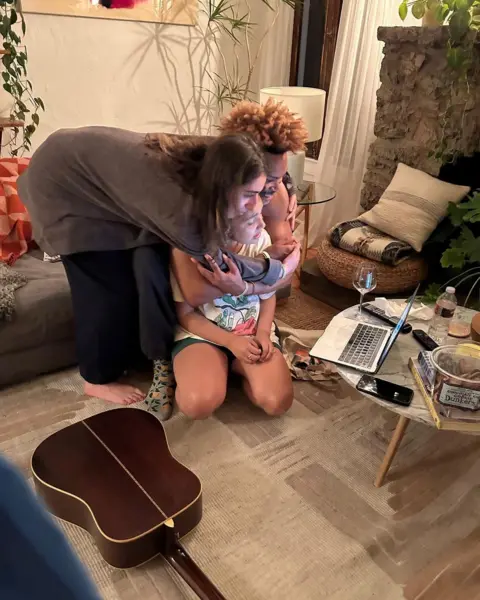 Cinya Kahn / Instagram
Cinya Kahn / InstagramIn February 2022, the friends surrendered to the inevitable. “Good news!” announced Cinya. “We are officially a group.”
All they needed was a name.
“We started texting words back and forth until something clicked,” recalls Cinya.
“I think I said ‘habits’ first, and then we were like Scary habits… Wild habits… Tiny Habits!”
The name is almost too perfect. The band’s music is rooted in small details – subtly plucked acoustic guitars, ethereal melodies and situationally-specific lyrics.
The early single Tiny Things, for example, is about finding romance in the mundanity of daily life, from changing the bed sheets to doing the dishes.
“Love is not a film re-enactment,” the trio observe. “I don’t need the moon or a mansion.”
By November, fellow Berklee graduate Lizzy McAlpine had employed Tiny Habits to accompany her on NPR’s prestigious Tiny Desk concert series.
Then, legendary music manager Steve Macklam, whose clients include Elvis Costello and Diana Krall, offered to represent them.
“We met him and fell in love with him,” says Maya. “And yeah, he opened literally every door possible.”
They recorded their debut EP in just two weeks and released it in April 2023. An album followed last month, with reviewers calling it “a folk-pop colossus” and “a pure joy to experience”.

Watching the group in concert, and meeting them over coffee the following morning, it’s clear Tiny Habits were meant to be together.
There’s a tenderness and intimacy to their friendship that’s reflected in the music.
During our interview, Maya keeps a sisterly, reassuring hand on Judah’s knee; and the trio frequently answer in unison. Even in conversation, their voices blend inseparably.
Each is a songwriter in their own right but, as they collected material for the album, they discovered they’d all been writing about the same thing: The pain of a one-sided relationship.
Judah’s song Flicker, for example, is an anguished realisation that he’s a mere accessory to the person he adores.
“Should’ve known by now, you like keeping me around ’cause I’m easy to have.”
Cinya’s track Malleable finds her drowning in the same river, trying to please a partner who ultimately isn’t interested.
In the end, it was Judah and Maya who helped her resurface.
“There was a lot of shame attached to it,” she says, “because this person had a lot of good qualities, too.
“I was like, ‘Am I wrong to think that they’re not treating me properly?’
“It takes friends to open your eyes to that.
“To have them go, ‘No, girl, you don’t deserve this’, was really powerful.”
She turns to her bandmates and whispers, “Thanks, guys.”
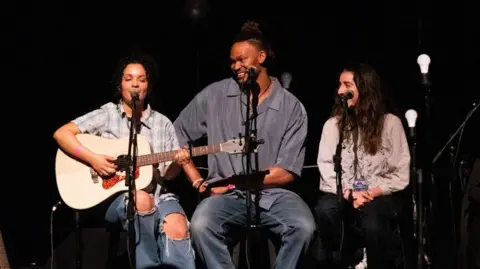 Getty Images
Getty ImagesWorking with your best friends can be challenging, though.
With a crammed schedule of touring, recording and promotion, the group recently realised their relationship was under strain.
“We felt we’d just become co-workers,” Cinya says. “We had to sit down and be like, ‘Aren’t we best friends? What’s going on?’”
“We’ve worked so much that when we had time off, we were like, ‘Maybe we need to take a step back’,” says Maya.
“But then there’s the fear of growing to hate each other or the friendship dying,” adds Judah.
“We realised that we needed to make time to be in each other’s presence outside of work, too,” Maya concludes. “You can’t rely on your past closeness.”
A conversation cleared the air and they’re hanging out again, away from concert halls and hotel rooms. Right now, their Instagram feeds are populated by goofy shots of day-trips to Paris and London.
The strength of their connection is most apparent on the album’s stand-out track, Wishes.
Divided into three sections, it finds the trio delicately exploring the changes they’d like to make in their lives. Cinya wants to call her mum more often, Maya wrestles with being too sensitive, and Judah longs to put his “foot down” and stop being a people-pleaser.
What makes it special is the realisation that the feeling of not being good-enough is universal.
When their voices unite, it sends a message that you’re not alone.
Allow Google YouTube content?
and
before accepting. To view this content choose ‘accept and continue’.
Aptly enough, Cinya started the song alone in her boyfriend’s bedroom, but when she sent it to her bandmates, they were compelled to add their own experiences.
“I was walking to the gym and I was like, ‘Let me put my phone down for a second and write something’,” recalls Judah. “It all came out so quickly. Like, boom, boom, boom, this is how I’m feeling.”
“Even when we recorded it, it all came out so easily. It felt very cathartic for all of us,” says Maya.
Tiny Habits’ rise comes during a boom period for country and folk, with artists like Noah Kahan, Shaboozey and Gracie Abrams scoring massive hit songs in the last 12 months.
Cinya says the musical axis seems to have swung away from superficial dance pop.
“I feel like we’ve reached a point in time where so many songs have been made, and so many things have been said, that the only thing that’s interesting is honesty and a clear perspective that can only come from you.”
“I feel like we’ve danced on the surface level of music for too long,” agrees Judah.
“I’ve heard the same exact thing over and over again, to the point where I feel like, ‘This is not resonating with me. This is just music’.”
“And that’s what’s exciting for us – because there’s three of us, with three different musical backgrounds.
“There’s still so much that we can explore musically.”



